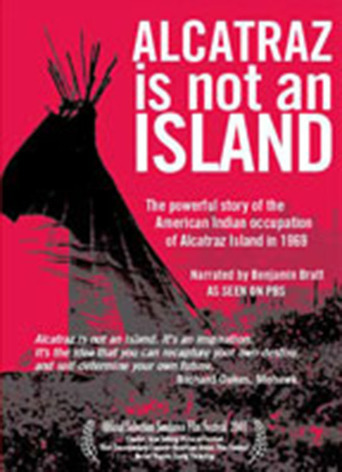



Very well executed
In truth, there is barely enough story here to make a film.
View MoreThere are moments in this movie where the great movie it could've been peek out... They're fleeting, here, but they're worth savoring, and they happen often enough to make it worth your while.
View MoreIt is encouraging that the film ends so strongly.Otherwise, it wouldn't have been a particularly memorable film
View MoreThanks for the thoughtful comments, but I just wanted to clarify that the film won Best Documentary Feature at the 1999 American Indian Film Festival in San Francisco, and I won an Emmy for Documentary Directing in 2001 after it premiered on PBS. As for casting the role of the late Richard Oakes, I would never in a million years consent to casting a non-Native to play Richard Oakes. To do so would be an insult to everything Richard lived and died for. Personally I would like to see Rudy Youngblood play Richard if a movie is ever made about Alcatraz or Richard's life. Cody Lightning would also be a good choice. When we made the documentary there was some pressure to get a big name non-Native to do the final narration, I won't mention the actor's name, but his voice is often heard on many Native American documentaries, and some people think he might be native because of his name, but he is not native, he's actually Jewish, anyway, Millie Ketcheshawno and I agreed that there was no way a non-Native was going to narrate this important Indian story and because Millie knew the family of our first choice, we succeeded in getting Benjamin Bratt the narrate. Benjamin Bratt and his siblings were just kids when their mother Eldie Bratt took them to the island during the occupation. You see Eldie Bratt is Quechua Indian from Peru and was very involved in the Bay Area Indian community at the time. So it was a perfect fit to have Benjamin Bratt narrate the film. IN the film there is an archival film shot just that begins the scene of Yvonne Oake's death. The little boy running through the weeds in slow motion is Benjamin Bratt's brother Peter (a talented filmmaker himself. Ben Bratt told us that when he came to SF to record the narration.
View MoreWhen he was interviewed by Edward R. Murrow, Adolf Hitler said, "I don't know why you Americans are making such a fuss about the Jews. We're only doing to the Jews what you did to the Indians." Alas, he had a point. "Alcatraz Is Not an Island" is a genuinely moving documentary that vividly chronicles one battle in the long struggle between white Americans and Native Americans that arose from a forced assimilation policy called "relocation and termination," imposed in the early 1950's, under which entire tribes would essentially be "disappeared" from their historic recognition as sovereign nations and their members the ones that had survived after the genocidal anti-Indian wars of the 19th century thrown into large cities and be forced to live an existence on their own without government help. "Alcatraz Is Not an Island" details the occupation of Alcatraz in 1969-71 by a group of Indians from different tribes who had found each other in San Francisco and built a community center (which burned down under mysterious circumstances shortly before the occupation began) and other infrastructure for mutual support. Its mix of archival footage and new scenes showing the surviving occupiers as they were in the late 1990's is moving, and Richard Oakes who wasn't the "leader" per se of the occupation but was elected as its spokesperson emerges as a truly tragic figure worthy of treatment in a dramatic film (if Joaquin Phoenix is looking for a follow-up to his star turn as Johnny Cash he need look no further).
View More